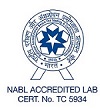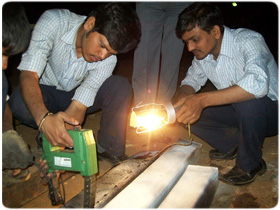-
Training & Certification
-
NDT training courses
- Ultrasonic testing
- Magnetic particle testing
- Liquid penetrant testing
- Radiography testing
- Eddy current testing
- Visual testing
- T-K-Y Joints UT
- Ultrasonic thickness gauging
- Radiographic film interpretation
- Basic NDT Course
- Metallurgy for non-metallurgists
Welding Inspector Courses
- American Welding Society(AWS) Certifications
- Welding Inspection Certification Course Exam preparatory courses
-
Training Schedules
Magnetic Particle Testing (MPT)
Magnetic particle testing or Magnetic particle inspection – called MPI inspection or magnetic crack detection - MPT / MT in short is one the most widely used Nondestructive testing method for inspection of ferro magnetic materials, components and structures made of Iron, Nickel and Cobalt alloys. As majority of engineering materials are predominantly made of Steel alloys this method is considered important in testing of materials in raw material, during manufacturing and in-service inspection stages. MPI testing is one of the predominantly used NDE method considering the operating cost of equipment, consumables and certified Level I / II inspectors.
Magnetic particle testing method detects surface and subsurface discontinuities. The depth of detection varies considerably from material to material based on magnetic permeability, strength of magnetic flux generated, magnetic particle properties, sensitivity desired and orientation of discontinuity with respect to the direction of magnetic field induced. Although test method can prove sensitivity up to approximately around 14mm under ideal conditions, but in actual practice the detectability or sensitivity is much lesser.
MPI inspection method is used for testing Automobile components, railway components, precision engineering components, shafts, gears, forgings, castings, plates, bars, rods, rolled products, cylinders, pistons, hydraulic components, pressure vessel and boiler components, welded joints, structures, Aerospace components, components for ships, mining equipments, oil and gas pipe line construction, storage tanks, bridges and other engineering components. Also this method detects fatigue cracks and other in-service discontinuities effectively. MPI equipments such as Permanent magnets, electromagnetic yokes, bench type MPI equipments with head shot technique, central conductor and coil techniques and prod technique are commonly used. This method also can be suitable for automation to test mass production components for detecting cracks and other anomalies. Know more about Trinity NDT – NABLISO17025:2017 Accredited Inspection Services on MPI testing
The test results depends largely on skill and proficiency of the magnetic particle testing MT Level I / II technician and it is essential to engage only qualified and certified professionals to carry out MPI testing. Employer based Certification program such ASNTSNT TC 1A Level 1, Level 2, Level 3 in Magnetic particle testing MPI Testing or EN479 or ISO9712 Level I and Level 2 or IS 13805 are some of the important training and certification courses available to get the individual to get certified in MPI testing.
Trinity Institute of NDT Technology – A Unit of Trinity NDT offers World Class Training and Certification course on Magnetic particle testing/inspection – MT Level I, Level II delivered from state of art NDT Labs and international training centre located at Bangalore, India. Operators can be certified to Level I and Technicians can be certified to Level 2. Trinity NDT MPI Labs are NABLISO17025:2017 accredited and approved by various aerospace OEMs. The quality and course outline for each NDEtraining course is precisely designed NDT Level III, monitored delivered by experienced expert trainers. Hands on practical sessions are part of the course and arranged at Trinity NDT - Aerospace NDT Labs. At the end of the training course examinations are held to asses each candidate for the performance.Examination results are evaluated by NDT Level III in magnetic particle testing and results are announced. Download the course Outline.
Visit Upcoming Training Schedules for Next Training Course or
Training course objective:
To provide a basic Knowledge of MT to enable a participant to carry out tests according to a established procedure under supervision of a level II or III personnel. The course is especially designed to provide a sound theoretical knowledge and practical skill for MT required for a level I technician.
MT Level I Responsibilities
To carry out operations as per written procedure/instruction from level II personnel. He shall be able to set up equipment, calibrate and carry out tests, classify and report the results. He shall not be responsible for the choice of test technique nor for assessment of the test results.
MT Level I Course outline
- Basic of Magnetism
- Magnetisation Techniques
- Inspection Mediums
- Inspection Techniques
- Indication Classification
- Test Equipments and Accessories
- Demagnetisation
- Types of Discontinuities
MT Level I Practical Training
Yokes, Prods, Headshot, Central Conductor, Coil Techniques, Using dry, wet ordinary and wet fluorescent powders, Demagnetisation.
Magnetic Particle Testing (MPT) Level-II
Training course objectives
The course is intended to provide detailed instruction in theory and practice such that the personnel shall be able to
- Identify suitability of MT for material and inspection procedure.
- Develop inspection techniques and procedure that shall be followed by level I operator.
- Analyse the test results.
Top of page
MT Level II Responsibilities
- To select proper test technique and equipment as per established procedure
- To calibrate, set and carry out test or supervise testing by level I operator
- Prepare test report for acceptance/rejection as per standard
- Have knowledge of merits and limitations of MT and other common NDT methods
- Prepare written procedure for level I operator
- Responsible for care and maintenance of testing machines and accessories
MT Level II Course outline
- Review of Level-I course
- Selection of Techniques
- Codes, standards and Procedures
- Acceptance Standards
- Manufacturing Process and Discontinuities
- Interpretation of Indications
- Preservation of Indications
- Evaluation of Test Equipment
MT Level II Practical Training
Same as Level-I + Interpretation, evaluation and recording of test results.
Magnetic Particle testing Training Brochure: Download
Training Courses Venue
Though the above specified quality courses are organized at World class International training center in Peenya Industrial Estate, Bangalore, India, we also are capable to serve the customers at their works. Trinity Institute of NDT Technology also conducted NDT training certification for Level I & II and Welding inspector training on specific requests from the clients at India, Delhi - NCR, Mumbai - Maharashtra, Chennai - Tamilnadu, Kolkata – West Bengal, Hyderabad - Telangana, Cochin - Kerala, Ahmedabad - Gujarat, Gurgaon – Uttar Pradesh, Pune - Maharashtra, Goa - Panjim, Nagpur - Maharashtra, Visakhapatnam-Vizag – Andhra Pradesh, Vijayawada, Kakinada, Nellore – Andhra Pradesh, Bhubaneswar - Odisha, Ranchi - Jharkhand, Bhilai - Chattisgarh, Mangalore - Karnataka, Belgaum - Karnataka, Coimbatore - Tamilnadu, Ernakulam – Kerala, Bhopal – Madhya Pradesh, Jaipur – Rajasthan, Patna – Bihar, Jalandhar – Punjab and other industrial cities in India. If there are sufficient strength of personnel, Trinity NDT can depute trainers to provide onsite, on-job, in-house training on NDT Level I and Level II, Welding Inspection and Welder’s skill improvement training programs. Course contents can be tailor made and designed to meet specific requirement of customers.
Our courses have won international reputation and over 40 country nationals have attended the certification courses with us. Nationals from the following countries have undergone training with us: India, Australia, USA, UK, Dubai, Russia, Thailand, Malaysia, Singapore, Israel, Papua New guinea, Nigeria, South Africa, Kenya, UAE, Saudi Arabia, Oman, Turkey, Yemen, Qatar, Philippines, Maldives, Sudan, Pakistan, Afghanistan, Bangladesh, Srilanka, Azerbaijan, Bhutan, Nepal, Iraq, Syria, Libya, Cameroon, Angola, Congo, Portugal, Uganda etc.,
Trinity NDT certification training courses are rated as best quality in terms of modern infrastructure, NDT workshops/labs and equipments & accessories for practical, eminent trainers by the training participants and reviews on our courses can be read online at our Facebook page. Visit our training schedules page or course calendar for upcoming training schedules.
Top of page


